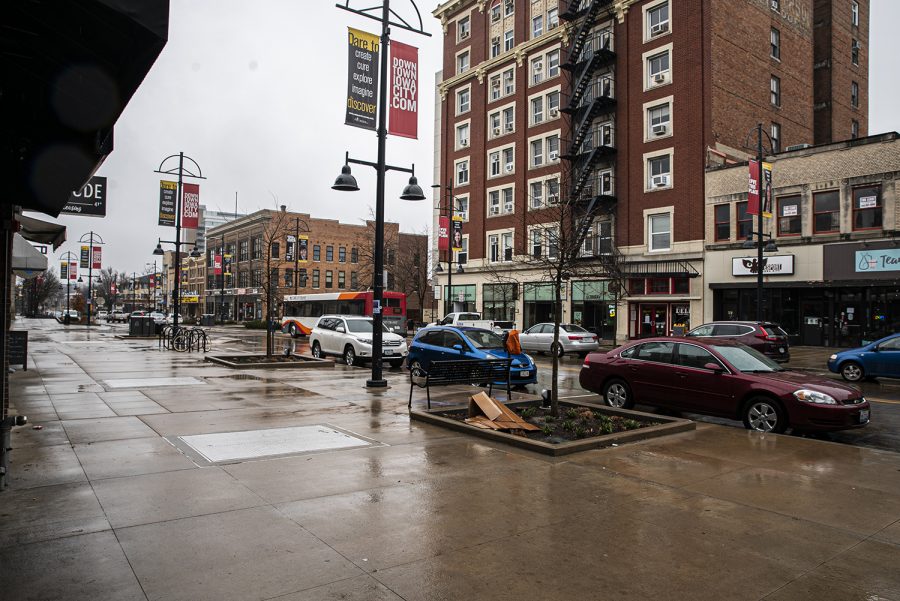Businesses bear COVID-19 cost burden
Iowa City locals deal with the loss of certain jobs as a result of the COVID-19 pandemic and community spread.
East Washington St. is seen empty on Wednesday, March 18th, 2020. The spread of coronavirus in Johnson county has been named a public health emergency.
March 22, 2020
As the COVID-19 pandemic brings Iowa City’s downtown activity to a near halt, locals are seeking ways to stay afloat amid job losses.
Iowa Gov. Kim Reynolds on March 17 announced a health-disaster emergency and the closure of bars, fitness centers, theaters, casinos, locations of mass gatherings, and senior citizen centers and adult daycare facilities to the public. Following this, on Sunday Reynolds closed salons, barber shops, spas, swimming pools, and tattoo parlors.
Iowa City on March 18 announced a civil emergency, allowing authorities to enforce Reynolds’ declarations in an effort to curb the spread of COVID-19 within Iowa City.
University of Iowa fourth-year student Grace Oeth said the process of closing business for her workplace, Iowa Avenue restaurant St. Burch, started gradually, originally with intensifying sanitation precautions, then eventually calling people off of work.
“Typically, the first weekend before spring break is slow anyway, but at this point, it was just brutal,” she said. “I mean, you get like a few tables and everything, but they were calling off a lot of people who were scheduled or telling us they didn’t need to come in or they could leave early.”
The night of March 16, the staff got an email that the restaurant would shut down, moving to to-go service only.
St. Burch isn’t Oeth’s only job. She also works at the UI Main Library and has two other internships, but the restaurant was her primary source of income.
“The job at St. Burch was the one that was making me the most money and was the one that was helping me pay my bills, and my rent,” she said. “So, actually … I had to apply for unemployment benefits through the Iowa state government.”
Oeth said she hopes the government steps in and provides assistance to communities as they face this situation.
On the other side of the service industry, UI student and local musician Lily DeTaeye is now relying on merchandise sales and donations, as she canceled all of her upcoming shows through April. This week, she was supposed to play at South by Southwest in Austin, Texas. Now, she’s scrambling to get everything online.
“I’m kind of over being sad about it because obviously it sucks, but I’m in a really unique and lucky position that a lot of people are not in where I still have flexibility to do my job online, more or less,” she said. “So, I’m trying to not squander that.”
DeTaeye is in the process of creating a more comprehensive merchandise website, as well as planning donation-based livestreams in place of her concerts.
“It for sure affects us musicians and I am uniquely in a lucky position where I have access to the internet and I’m staying with my family,” she said. “I’m trying to do what I can to keep it up and running. And when everything does return back to normal, whether that’s a couple months from now or at the end of the year, I’ll be ready to jump back in.”
The singer-songwriter said that because she realizes COVID-19 is impacting everyone financially, her shows will also be available for free.
“If you even just need a little bit of a pick me up or if maybe you’ve never been able to see a show, but you don’t have the money to buy a $10 online ticket then, obviously there’s no harm there,” she said. “That’s why we do our job — for the enjoyment of people ultimately.”
North Liberty resident Matt Hylland is trying to give support to the workers at Red’s Alehouse, a place he and his wife Claire have frequented since they moved to the area.
“Red’s has just kind of been our local stomping ground, where it seems like we ended up for dinner once a week or for drinks in the evening,” he said. “We saw the same faces over and over again, we’ve seen them go through college or have kids or get married. So, it’s just kind of been a fun place for us to keep going back to just because we do see it as being with friends and family.”
When Hylland saw COVID-19 closures affecting local restaurants, he thought of a way he could help Red’s, and its staff, stay afloat.
“I just knew that as soon as places started talking about restaurants closing down or encouraging people not to go to restaurants that some people that we’ve really gotten to know and who we consider friends and family almost were just going to be really hurt by it,” he said.
Hylland started a GoFundMe for the staff, with a goal of $1,000, and after meeting that goal, has set a new goal of $2,500. The fund is currently at $2,760 as of Sunday evening.
“Obviously, public safety needs to be a priority, but they’re also asking these businesses to stretch themselves very thin, or put hundreds of thousands of people on unemployment,” he said. “I know there’s talks and I know things have to move a little slowly, but you’d sure hope there’s some kind of kind of fiscal or monetary assistance to help both businesses and workers out.”
The Small Business Administration declared Iowa a disaster location March 21, allowing small businesses and nonprofits in the state to apply for low-interest federal loans to offset the economic impact of government-issued closures. Iowa has about 267,000 small businesses, the Small Business Administration estimated in 2018.
Brian Richman, the director of Tippie College of Business’ Hawkinson Center for Business Finance, said that while the state can’t do much to bail out local economies, as Iowa’s government can’t run deficits per Iowa code, the national government is likely to spend billions on aid, bail outs, and stimulus packages.
“Some of that will be unemployment benefits and aid to help individuals,” he said. “Some of it will be bailouts for airlines and plenty of other industries, others will be stimulus programs to get people employed and get the economy going again. It’ll be huge numbers, for sure.”
Richman said it would likely be years for the economy to recover. Along with local employees having to seek unemployment, the temporary shutdown may prove fatal for some businesses.
“Some local businesses, sadly, probably won’t come back,” he said. “It’s tough because when you think about it, if they’re not open, they potentially have a lot of fixed expenses. They have real estate costs, insurance costs, rental … they’ve got insurance. It’s a big number monthly that someone has to write a check for.”






